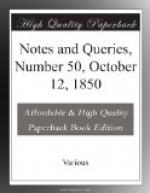Birmingham.
Pilgrims’ Road to Canterbury.—Being acquainted with the road to which your correspondent S.H. (Vol. ii., p. 237.) alludes, he will, perhaps, allow me to say, that in the neighbourhood of Kemsing a tradition is current, that a certain line of road, which may be traced from Otford to Wrotham, was the pilgrims’ road from Winchester to Canterbury. How far this may be correct I know not.
I have not been able to discover any road in the neighbourhood of this city which goes by the name of the pilgrims’ road.
If any of your correspondents would furnish any particulars respecting this road, I shall feel much obliged.
R.V.
Winchester.
Capture of Henry VI. (Vol. ii., p. 228.).—In his correction of your correspondent, CLERICUS CRAVENSIS, MR. NICHOLS states:—
“Both Sir John Tempest and Sir James Harrington of Brierley, near Barnesley, were concerned in the king’s capture, and each received 100 marks reward; but the fact of Sir Thomas Talbot being the chief actor, is shown by his having received the larger reward of 100l.”
In this statement appears entirely to have been overlooked the grant of lands made by King Edward IV. to Sir James Harrington—
“For his services in
taking prisoner, and withholding as such in
diligence and valour, his
enemy Henry, lately called King Henry
VI.”
This grant, which was confirmed in Parliament, embraced the castle, manor, and domain of Thurland; a park, called Fayzet Whayte Park, with lands, &c. in six townships in the county of Lancaster; lands at Burton in Lonsdale, co. York; and Holme, in Kendal, co. Westmoreland, the forfeited lands of Sir Richard Tunstell, and other “rebels.” So considerable a recognition of the services of Sir James Harrington would seem to demand something more than the second-rate position given to them by your correspondent. The order to give Sir James Harrington possession of the lands under his grant will be found in Rymer. The grant itself is printed in the Nugae Antiquae, by Henry Harrington, 1775 (vol. ii. p. 121.), and will, I believe, be found in Baines’ Lancashire. Mr. Henry Harrington observes that the lands were afterwards lost to his family by the misfortune of Sir James and his brother being on the wrong side at Bosworth Field; after which they were both attainted for serving Richard III. and Edward IV., “and commanding the party which seized Henry VI. and conducted him to the Tower.”
H.K.S.C.
Brixton.
Andrew Becket (Vol. ii., p. 266.), about whom A.W. HAMMOND inquires, when I knew him, about twelve years ago, was a strange whimsical old gentleman, full of “odd crotchets,” and abounding in theatrical anecdote and the “gossip of the green-room.” But as to his ever having been “a profound commentator on the dramatic works of Shakspeare,” I must beg leave to express my doubts. At one period he filled the post of sublibrarian to the Prince Regent; and that he was “ardently devoted to the pursuits of literature” cannot be a question.




